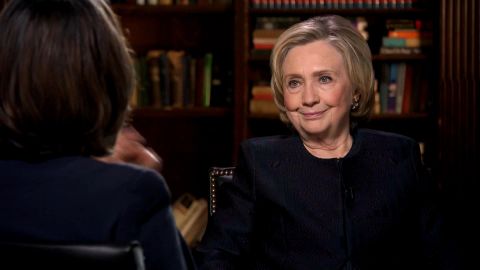Read Transcript EXPAND
CHRISTIANE AMANPOUR, CHIEF INTERNATIONAL ANCHOR: We spoke about today’s disruptive politics in part of part one of our conversation. Tonight, we want to bring you up to date with Hillary Rodham Clinton as she starts teaching the next generation of diplomats about effective leadership and global crises. Very timely indeed. And she explains why today’s epidemic of loneliness can also damage democracy. And on a note, this conversation took place at Georgetown University in Washington, D C. before October 7th.
(BEGIN VIDEO CLIP)
AMANPOUR: You’re back at university — Columbia University, teaching in the Situation Room.
HILLARY CLINTON, FORMER U.S. SENATE DEMOCRAT: Right.
AMANPOUR: How are you communicating all of this to, let’s say, the Gen Z, who are your students?
CLINTON: You know, I’m having an incredible time because the students, it’s a very large class. 375 students, about a quarter are undergraduates, the others are graduate students in the School of International and Public Affairs where I’m teaching, but they’re also from the journalism school, and the law school, and the engineering school. And it’s a wonderful multi- international student body. So, I’m co-teaching with the dean of SIPA, who is a political science of — scientist of great note who has written about how leaders make decisions, Keren Yarhi-Milo. And so, her part of the class is talking about the theories, you know, how do we figure out, usually has to be in retrospect, how somebody makes a decision, what influences them, what are their biases, what are their advisers telling them, you know, how confident or lack of confidence is affecting them? And I am, you know, reading the literature and having a great time doing that, since I didn’t do it before, but I am finding out, you know, in retrospect. So, I’m doing that, but I’m also talking about real world examples.
AMANPOUR: Yes.
CLINTON: So, you know, when you talk about face-to-face diplomacy, or you talk about intervening militarily or even on a humanitarian basis, what goes into making those decisions and why are some leaders, you know, more successful in making difficult decisions and others are not? And it’s a really fascinating set of, you know, challenges that we’re posing to the students. And then at the end, we take 20 minutes and answer questions. And the students, because they come from all over the world, ask about the world. So, it’s real-world experience, but trying to take a broad view about how decision making actually works.
AMANPOUR: America, under your stewardship, was notably the first country to appoint ambassador for Global Women’s Affairs, Melanne Verveer. A few years later, the Swedish foreign minister talked about a feminist foreign policy. A decade later, some 16 governments have adopted that. And they show, whether it’s what we’re talking about, conflict, peace health, GDP, that there are material improvements in all of those when women are equally represented. Do you feel that what you’ve done has been a success, there’s also backlash? Iran, Afghanistan, the United States rolling back women’s rights.
CLINTON: I feel like we’ve made progress, but there has been a backlash and much of the progress for women, not just in peace and security, but in health and education and economic opportunity was set back during COVID. So, we are playing a bit of catch up. But it is significant that a number of countries have made it clear that women have to be part of any foreign policy calculation and decision. And why is that important? Well, it’s important because we now have a lot of data, and we’re here at Georgetown, and the Institute of Women Peace and Security run by the first ambassador for Global Women’s Issues, Melanne Verveer, has done an extraordinary job in collecting and collating all of the data about how women at a peace table leads to a more durable peace. How women’s voices in deciding about refugee flows and migration issues and healthcare challenges is essential if we’re going to make sensible policies. None of this should be new to people, but as we both know, women are still often an afterthought in many settings, not just governmental, not just with respect to foreign policy or security, but in the private sector and elsewhere. And so, this backlash is not only very unfortunate and sets women back, but it loses sight of the larger goal. You know, we want to get to a point where women are just, as a matter of fact, part of decision-making in every aspect of society. We don’t have to make a special effort. We don’t have to have a special ambassador. We don’t have to have a special foreign policy. It’s so commonplace that you wouldn’t think about making decisions about including women’s voices, putting women at the table. You know, there’s that great line from Shirley Chisholm, who said, you know, a woman deserves a seat at every table. And if there’s not a seat, bring a folding chair. So, I’m kind of like the — you know, the advocate for folding chairs, get women at the table because we also know diverse groups make better decisions.
AMANPOUR: Yes.
CLINTON: And does it get some people out of their comfort zone? Yes, it does. But that’s because you’re hearing things and learning things that may be new to you. And you’ve got to be able to take that on board.
AMANPOUR: I interviewed a few weeks ago at the U.N the German foreign minister, a woman, Annalena Baerbock. And she evolved your famous statement that women’s rights are human rights. And she said, women’s rights are hard policy. Women’s rights are security policy. So, there is an evolution from the niche that it was.
CLINTON: Yes, there is.
AMANPOUR: Yes.
CLINTON: Absolutely.
About This Episode EXPAND
Former U.S. State Dept. Middle East negotiator Aaron David Miller discusses divisions in American halls of power with respect to Israel’s war on Hamas. Judy Meyer discusses what is known so far about the mass shooting in Maine and how the state is reacting. A new biography by McKay Coppins explores Mitt Romney’s political career. Part two of Christiane’s conversation with Hillary Clinton.
LEARN MORE

